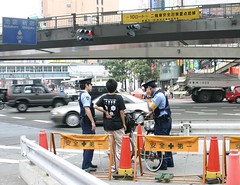Sunday, August 06, 2006
Are You Riding a Stolen Bicycle?
These Japanese police officers weres stopping cyclists at random, and checking that the id of the rider matched the registration of the bicycle over their walkie-talkies. In order to combat bicycle theft, bcicycle registration became a legal requirement about 8 years ago.
From a very brief survey of the people that the police were stopping and checking, it would seem that they were concentratiing on those riding the standard, cross bar-less, shopping bicycles (mama-chari - mum's bikes). This suggests to me that the majority of bicycle theft is of such bicycles for the purpose of riding them rather than for the purpose of selling them to a third party. There are quite a lot of expensive mountain bikes and road bikes parked with flimsy locks, or no locks at all. But there are even more shoppers, without locks or with easily breakable built in front wheel locks (which can be twisted so that they do not interfere with the movement of the spokes. These bicycles are about 100 USD new in Japan. They are often abandoned even by their owners and large numbers of them are seen at rubbish collection stations on those days when "large rubbish" can be thrown away. It is my perception that some Japanese people tend to see such bicycles almost as a communal resource. Some towns, such as my old town of Kurume, have organisations that provide bicycles - painted blue - at stations for free for public use.
Perhaps the OECD statistics regarding the rate of theft of bicycles and the fact that bicycle theft represents 30% of crime as experienced by Japanese.
From a very brief survey of the people that the police were stopping and checking, it would seem that they were concentratiing on those riding the standard, cross bar-less, shopping bicycles (mama-chari - mum's bikes). This suggests to me that the majority of bicycle theft is of such bicycles for the purpose of riding them rather than for the purpose of selling them to a third party. There are quite a lot of expensive mountain bikes and road bikes parked with flimsy locks, or no locks at all. But there are even more shoppers, without locks or with easily breakable built in front wheel locks (which can be twisted so that they do not interfere with the movement of the spokes. These bicycles are about 100 USD new in Japan. They are often abandoned even by their owners and large numbers of them are seen at rubbish collection stations on those days when "large rubbish" can be thrown away. It is my perception that some Japanese people tend to see such bicycles almost as a communal resource. Some towns, such as my old town of Kurume, have organisations that provide bicycles - painted blue - at stations for free for public use.
Perhaps the OECD statistics regarding the rate of theft of bicycles and the fact that bicycle theft represents 30% of crime as experienced by Japanese.
Labels: crime, culture, economics, japan, japanese culture, nihonbunka, 日本文化
This blog represents the opinions of the author, Timothy Takemoto, and not the opinions of his employer.

